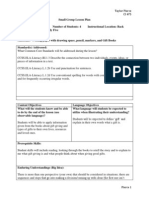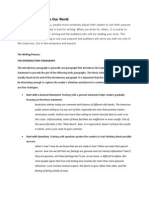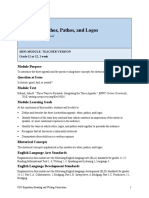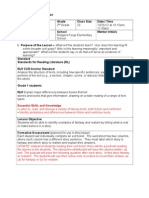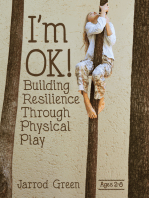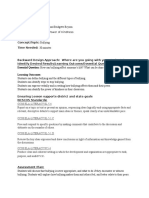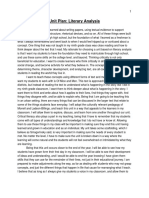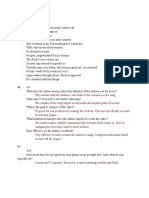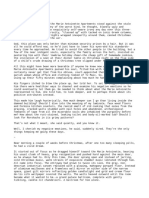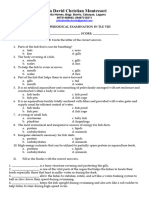0 ratings0% found this document useful (0 votes)
22 viewsRW Lesson 2
RW Lesson 2
Uploaded by
isabella marieThis document discusses 8 common patterns of paragraph development: narration, description, definition, exemplification/classification, cause and effect, comparison and contrast, problem-solution, and persuasion. For each pattern, it provides examples to illustrate how each pattern is used to organize ideas and information within a paragraph.
Copyright:
© All Rights Reserved
Available Formats
Download as PDF, TXT or read online from Scribd
RW Lesson 2
RW Lesson 2
Uploaded by
isabella marie0 ratings0% found this document useful (0 votes)
22 views71 pagesThis document discusses 8 common patterns of paragraph development: narration, description, definition, exemplification/classification, cause and effect, comparison and contrast, problem-solution, and persuasion. For each pattern, it provides examples to illustrate how each pattern is used to organize ideas and information within a paragraph.
Original Title
RW-LESSON-2
Copyright
© © All Rights Reserved
Available Formats
PDF, TXT or read online from Scribd
Share this document
Did you find this document useful?
Is this content inappropriate?
This document discusses 8 common patterns of paragraph development: narration, description, definition, exemplification/classification, cause and effect, comparison and contrast, problem-solution, and persuasion. For each pattern, it provides examples to illustrate how each pattern is used to organize ideas and information within a paragraph.
Copyright:
© All Rights Reserved
Available Formats
Download as PDF, TXT or read online from Scribd
Download as pdf or txt
0 ratings0% found this document useful (0 votes)
22 views71 pagesRW Lesson 2
RW Lesson 2
Uploaded by
isabella marieThis document discusses 8 common patterns of paragraph development: narration, description, definition, exemplification/classification, cause and effect, comparison and contrast, problem-solution, and persuasion. For each pattern, it provides examples to illustrate how each pattern is used to organize ideas and information within a paragraph.
Copyright:
© All Rights Reserved
Available Formats
Download as PDF, TXT or read online from Scribd
Download as pdf or txt
You are on page 1of 71
Patterns of Written Texts
Writing pattern or pattern of paragraph
development refers to a specific strategy or
method that a writer uses to develop ideas
in a paragraph.
It suggests a type of support to an idea
that one can use in a type of paragraph.
It also helps a writer how to make sense
of the different pieces of information.
• narration
• description
• definition
• exemplification / classification
• cause and effect
• comparison and contrast
• problem - solution
• persuasion
1. Narration
The focus of this pattern is basically to
narrate or tell a story.
It emphasizes the what, when, and where
something happened.
Its purpose comes along with effective
sequencing order of events in a
chronological order.
Moreover, action words and transitional
words characterized a narrative paragraph.
Yesterday, Thea and her two brothers, Michael and
Edward had the most wonderful time together. They
strolled in the mall. They went inside the
department store and bought bucket hats and
matching shirts.
Next, for lunch, they ate at their favorite
restaurant, ordered the usual chicken and rice
combo and shared many funny moments.
After that, they watched a comedy movie and
laughed their hearts out. After a long day, they went
home tired but fulfilled. They definitely shared good
moments together and bonded more as siblings.
2. Description
This pattern of development gives characteristics or
details on what an object, a person or a place looks
like.
When using this pattern, use powerful and
appropriate adjectives and use effectively the five
senses (sight, smell, taste, hear, touch) to create a
clear image on a reader’s mind.
Objective description is used in scientific writing to
describe factual and scientific characteristics.
Subjective description is used in fiction wherein a
writer uses his own perspective to describe a person,
an event or a thing.
Every summer, my brothers and I spend our
vacation in my Lola’s house. It always feels like
my first home. It is already an old house. You
could already say it’s old because of the worn-out
fences.
Still, I love spending my summer there. When
you go inside, that musty smell welcomes you or
the smell of rice cakes from the kitchen. Lola
really loves to make rice cakes and my favorite is
‘suman’. Every day is a fun day.
My brothers and I would either play in Lola’s
backyard with her dog, Bantay or we go to the
river nearby. In the next morning, she would then
cook delicious meals and they’re all tasty. Lola’s
home is always a happy home.
3. Definition
The focus of this pattern is to explain or give a
comprehensive understanding of a concept, a
term or an idea. To define a term, a writer
provides a general definition, then gives clear
details to support.
You may define a term or a concept by its
characteristic, function, example, origin or
effect.
There are two types of definition -
scientific and subjective.
Scientific definition defines concepts in
the most factual way.
Subjective definition defines complex terms
in a personal way.
I was once asked by my college professor
before, “What is passion?” This is a typical
question for a painter and an artist like me.
As they say, you will never excel as an artist if
you don’t have passion within you. What is
‘passion’? My teacher once told me that
passion comes from a Latin root ‘pati-‘,
meaning ‘suffering, or enduring’.
From then on, my teacher taught me that
passion is not just something you earn in a
night or after studying arts. It’s something
you have to learn over the course of life.
I then learned that passion is something I
need to learn to feel by enduring not just the
highs of life but also the downtimes. It also
goes with loving what I do.
4. Exemplification and
Classification
Exemplification is a pattern of development
wherein a writer uses examples to illustrate and
further explain an idea. By this pattern, examples
used clarify more the general idea in the
paragraph.
Classification divides and organizes ideas or
concepts in classes, groups or categories based on
criteria and relationships between the items. This
pattern helps the reader understands even the
complex and vast idea as it will be classified.
You can be awesome on your ‘first day high’ in
college by being friendly, responsive and easy-
going. In that case, you can immediately have
friends and be at ease in your journey to college.
First, be friendly. For example, always be the first
one to say “Hi!” and introduce yourself. For you
not to look awkward, always wear a smile.
Next, be responsive. A first day is always a
getting-to-know stage. Whenever a person asks
you a question, answer accordingly.
As long as it doesn’t hurt or offend you, just
go for it. Basically, these are the “must be-
attitudes” if you’re a freshman.
5. Cause and Effect
This pattern of development discusses why
something happens and what results a
particular occurrence or event. They can be
discussed together.
However, in a particular paragraph, one or the
other will be emphasized. It may be a
paragraph emphasizing a cause or a paragraph
emphasizing an effect.
A paragraph that emphasizes the causes
begins with an effect; the purpose of the
paragraph is to discuss how that effect came
to be and to show what caused it.
On the other hand, in a paragraph that
emphasizes the effects begins with a
particular cause, then explores the
consequences.
Several factors contribute to the frequent use
of different social media platforms by
teenagers. First, it is their way of connecting to
friends and widening their network of friends.
Since everyone is in Social Media, they feel a
need to be there and join group conversations.
It is their way of relating to others.
Second, teenagers tend to feel like they might
miss out if they aren't always up to date with
social media. They can even stay online in a
day and they would never feel tired in just
scrolling.
Lastly, because of boredom, they choose to be
occupied in their social media profiles and
continue connecting to other people.
However, being too much absorbed in social
media may result to a bad turn-out. That’s
why, parents should guide their children and
be updated on the things their children
explore
6. Comparison and
Contrast
Comparing means looking on the similarities.
Contrasting means looking on the differences.
Thus, Comparison and Contrast, as a pattern,
discusses and organizes ideas based on how
people, events, places and things are similar or
different to one another
There are two approaches that a writer can do to
discuss the similarities and difference.
The first one is separately. The writer describes
the first element then followed by the second
element.
The second is side-by-side. The writer
discusses both items based on each point of
comparison and contrast.
Mikko certainly loves his two best friends,
Anton and Abu. However, they have
completely diverse personalities. Although
Anton and Abu both have strict parents, their
attitudes are very different.
Anton is very conservative and always careful
with his words. In contrast, Abu is very out-
going and is always careless when he talks.
When it comes to hobbies, they are also
different.
Anton loves reading books while Abu loves
fishing in the river. However, even though
they are totally different, they all agree on one
thing, and that is playing basketball. That’s
how they always bond and keep their
friendship.
7. Problem-Solution
In this pattern of development, the writer
presents a problem that needs to be resolved.
The paragraph states a concerning issue or a
problem then next is the solution or what should
be done to solve the issue.
A paragraph that uses problem-solution has
three main parts: topic sentence introduces the
solution to a problem, body sentences explain
the problem and solution and ending sentence
which calls readers to action.
Obesity among adults showed a gradually
increasing trend as it has become one of the
major problems in the Philippines nowadays.
This problem is made worse by bad habits
such as lack of physical activity, excessive
smoking and unhealthy diets. Aside from
healthier eating habits, one solution to this
would be to exercise on a daily basis.
There are even easy and convenient ways to
exercise at home or even at work. That’s
why, before it’s too late, obese adults should
take this into consideration before it
aggravates and might lead to more
complicated illnesses.
8. Persuasion
In this pattern, the writer describes an issue
and states his position in the issue. The
writer’s primary goal is to convince the
readers to agree with the argument or claim
being raised, based from a particular topic.
A persuasive paragraph starts with a topic
sentence. It states position or stand about
something. The body sentences explain the
reasons supporting the position or stand, and
the closing sentence reiterates or intensifies the
thesis statement.
Education is a right and not just a privilege.
First of all, one of the rights of a child is the
right to education. He has the right to learn, to
know, to explore and to discover.
Thus, education must be available for all
without discrimination. Not one’s status in the
society should dictate if one deserves quality
education or not. As observed, illiteracy of
some affects everyone.
Meanwhile, this problem of illiteracy happens
to someone who can’t afford school and is
usually in the marginalized sectors. Basically,
education heals ignorance.
Therefore, let education be given to everyone.
Hence, education is and should be a right.
Government should strengthen and empower
education for all.
You might also like
- Student Number: 57208816. Module Code: TMS3719. Assignment Number: 04. Unique Number: 612894Document8 pagesStudent Number: 57208816. Module Code: TMS3719. Assignment Number: 04. Unique Number: 612894Lebo LizzyNo ratings yet
- Small Group Lesson PlanDocument24 pagesSmall Group Lesson Planapi-252466047No ratings yet
- Homeroom Guidance Module 2 PPT - G12Document28 pagesHomeroom Guidance Module 2 PPT - G12Maricar Tan Artuz85% (13)
- Biotech8 q2 Mod2 Traditionalbiotechnology v1-3Document32 pagesBiotech8 q2 Mod2 Traditionalbiotechnology v1-3Jaken Mack100% (2)
- PATTERNSDocument9 pagesPATTERNSRazel ForrosueloNo ratings yet
- CORE 001 3rd Quarter - Lesson 3Document7 pagesCORE 001 3rd Quarter - Lesson 3NatsumiGraceNo ratings yet
- Thesis and Topic Sentence 1Document5 pagesThesis and Topic Sentence 1Ashwin VelNo ratings yet
- Expository Writing Supplementary MaterialDocument29 pagesExpository Writing Supplementary MaterialdehbashiharifNo ratings yet
- Capstone Project ProposalDocument9 pagesCapstone Project Proposalapi-652938628No ratings yet
- w08 Best ofDocument2 pagesw08 Best ofmadelynoliversonNo ratings yet
- Q2 LP RHGP GradeviiiDocument7 pagesQ2 LP RHGP GradeviiiEbs DandaNo ratings yet
- Learner ProfileDocument35 pagesLearner ProfileAsiya HaseenNo ratings yet
- How To Become A Great Political Scientist in The FutureDocument12 pagesHow To Become A Great Political Scientist in The FutureCamilla Patricia Mayugba WoolfNo ratings yet
- Introducing Ethos Pathos Logos-Teacher Version-FinalDocument11 pagesIntroducing Ethos Pathos Logos-Teacher Version-FinalCaryl MartianNo ratings yet
- ELED363 Lesson Plan FR1 REVISEDDocument16 pagesELED363 Lesson Plan FR1 REVISEDejoine1No ratings yet
- ALLE2 Study MaterialsDocument74 pagesALLE2 Study MaterialsWai MarNo ratings yet
- ELED363 Lesson Plan FR1 REVISEDDocument10 pagesELED363 Lesson Plan FR1 REVISEDejoine1No ratings yet
- Learning Assessment 2Document4 pagesLearning Assessment 2shin chan100% (2)
- Use This One Edited - Capstone Project ProposDocument9 pagesUse This One Edited - Capstone Project Proposapi-652938628No ratings yet
- Critical Reading: Manuel S. Enverga University Foundation Candelaria Inc Quezon, PhilippinesDocument7 pagesCritical Reading: Manuel S. Enverga University Foundation Candelaria Inc Quezon, PhilippinesZyrine AdaNo ratings yet
- Introductiontophilosophy 11 Quarter 1 SLM 2Document29 pagesIntroductiontophilosophy 11 Quarter 1 SLM 2MITCHANGNo ratings yet
- Patterns of Development in Writing CollabDocument46 pagesPatterns of Development in Writing CollabKate BarilNo ratings yet
- Thesis Statement About Your MotherDocument5 pagesThesis Statement About Your MotherSarah Brown100% (2)
- Reading and Writing Skills SLK Patterns of DevelopmentDocument52 pagesReading and Writing Skills SLK Patterns of DevelopmentSchoology SHSNo ratings yet
- Q4 4 Shs Readingandwriting Assertions1 v1Document17 pagesQ4 4 Shs Readingandwriting Assertions1 v1DONABEL ESPANONo ratings yet
- Psychosocial Week 2Document36 pagesPsychosocial Week 2JENNIFER SERVONo ratings yet
- Bebe EngDocument123 pagesBebe Enganon_639200845No ratings yet
- Raw 1 & 2Document23 pagesRaw 1 & 2Junmel ValientesNo ratings yet
- Skillshare Essay Writing Course NotesDocument6 pagesSkillshare Essay Writing Course NotesAshleigh MaudeNo ratings yet
- HOMEROOM ModuleDocument9 pagesHOMEROOM Moduleemkey341No ratings yet
- Francia Lastra - Portfolio (1) ICPNA AVANZADO 10Document8 pagesFrancia Lastra - Portfolio (1) ICPNA AVANZADO 10orianalastra321No ratings yet
- Capstone Project Proposal DraftDocument8 pagesCapstone Project Proposal Draftapi-652928767No ratings yet
- Alyssa Pearly Joy MANANSALA-BEED1A-GMRCDocument6 pagesAlyssa Pearly Joy MANANSALA-BEED1A-GMRCpatrick batallaNo ratings yet
- The Roles of Read AloudDocument6 pagesThe Roles of Read Aloudapi-336570695No ratings yet
- Ccss - Ela-Literacy - Sl.5.4: EnceDocument5 pagesCcss - Ela-Literacy - Sl.5.4: Enceapi-354964761No ratings yet
- Childhood Literacy and Behavioral Development Pre-AssignmentDocument2 pagesChildhood Literacy and Behavioral Development Pre-AssignmentMaría José JaramilloNo ratings yet
- Narrative Report21Document13 pagesNarrative Report21Ian Dante ArcangelesNo ratings yet
- ص 5Document14 pagesص 5ahmedfw100No ratings yet
- Social Responsibility Program Volunteer Manual 2019Document21 pagesSocial Responsibility Program Volunteer Manual 2019Kamran TajNo ratings yet
- San Pablo Diocesan Catholic Schools Systems: ST NDDocument9 pagesSan Pablo Diocesan Catholic Schools Systems: ST NDAldrin MeladNo ratings yet
- Integrated Lesson Planning Form - Respecting DifferencesDocument6 pagesIntegrated Lesson Planning Form - Respecting Differencesapi-257858054No ratings yet
- Week 1 21st Century Skills, Facts and Opinions Frayer ModelDocument21 pagesWeek 1 21st Century Skills, Facts and Opinions Frayer Modelyunusberkay026No ratings yet
- ENGLISH 9 Q1 W5 Mod5 Communication StylesDocument21 pagesENGLISH 9 Q1 W5 Mod5 Communication StylesRonald Delos ReyesNo ratings yet
- Life Skills Handbook 2008 Download 4Document27 pagesLife Skills Handbook 2008 Download 4Daisy67% (3)
- LP 3,4 (Class Handouts)Document7 pagesLP 3,4 (Class Handouts)Altaf HussainNo ratings yet
- 6-4 Writing A Profile of A ClassmateDocument4 pages6-4 Writing A Profile of A ClassmateSamara EnyaNo ratings yet
- Unit Plan Assignment 2Document13 pagesUnit Plan Assignment 2api-313149031No ratings yet
- SOME ESSAY TOPICS TO CHOOSE FROM UpdatedDocument5 pagesSOME ESSAY TOPICS TO CHOOSE FROM UpdatedLevi OrjinwekeNo ratings yet
- Reflective WritingDocument5 pagesReflective WritingNellie TanNo ratings yet
- Reading and Writing: Quarter 3: Module 1 - Lesson 1Document6 pagesReading and Writing: Quarter 3: Module 1 - Lesson 1Joan Marie N. PamilaranNo ratings yet
- 1 Q3 Shs RWS PatternsofdevelopmentDocument6 pages1 Q3 Shs RWS PatternsofdevelopmentJoan Marie N. Pamilaran100% (1)
- Read 680 Classroom Modeling-1Document6 pagesRead 680 Classroom Modeling-1api-289598938No ratings yet
- BBD 74 A 2426540 Aba 9148Document14 pagesBBD 74 A 2426540 Aba 9148api-572480451No ratings yet
- Reflective Essay English ClassDocument5 pagesReflective Essay English Classlud0b1jiwom3100% (2)
- Mother Thesis StatementDocument6 pagesMother Thesis StatementHelpWithWritingAPaperForCollegeLasVegas100% (2)
- Fashion Essay TopicsDocument7 pagesFashion Essay Topicsafhbgohob100% (2)
- Essay Writing On MusicDocument5 pagesEssay Writing On Musictuevptvhd100% (2)
- Lesson 4 Patterns of DevelopmentDocument31 pagesLesson 4 Patterns of DevelopmentConnieRoseRamosNo ratings yet
- Ge 101 - Understanding The Self (Answer Sheet)Document4 pagesGe 101 - Understanding The Self (Answer Sheet)Mary Grace CawalingNo ratings yet
- AEIS Sample PaperDocument24 pagesAEIS Sample Paperb9qpkw5nxrNo ratings yet
- COA of MelatoninDocument1 pageCOA of MelatoninPan EmmaNo ratings yet
- Breeder Guide 2021 - Phase 2 Rearing and 3 MaintenanceDocument5 pagesBreeder Guide 2021 - Phase 2 Rearing and 3 MaintenancehadrifaNo ratings yet
- Chandrashekhar H. M. Changing Scenario of Organic Farming in India AnDocument6 pagesChandrashekhar H. M. Changing Scenario of Organic Farming in India AnAbhishek ViraniNo ratings yet
- History: Côtelette de VolailleDocument13 pagesHistory: Côtelette de VolailleJong.Gun.KimNo ratings yet
- Marie AntoinetteDocument5 pagesMarie AntoinetteTesterNo ratings yet
- When in TagaytayDocument11 pagesWhen in TagaytayMark Gerald L. SantosNo ratings yet
- The BeggarDocument24 pagesThe Beggaryvette.manzaneroNo ratings yet
- Soil Fertility Status Bari Khet Land Small WatDocument7 pagesSoil Fertility Status Bari Khet Land Small WatKshar Jung KhatriNo ratings yet
- 60 Important ARD Questions For NABARD Grade A Exam-Watermark - pdf-48Document7 pages60 Important ARD Questions For NABARD Grade A Exam-Watermark - pdf-48Siddhant BajhalNo ratings yet
- Proposal Template - Community ServiceDocument8 pagesProposal Template - Community Service22005334No ratings yet
- How To Increase Your Psychic Perception and Spiritual Experiences - Simona RichDocument3 pagesHow To Increase Your Psychic Perception and Spiritual Experiences - Simona RichSimona RichNo ratings yet
- Extraction of Phenolic Compounds From Olive Pomace by Using Natural Deep Eutectic Solvents and Innovative Extraction TechniquesDocument12 pagesExtraction of Phenolic Compounds From Olive Pomace by Using Natural Deep Eutectic Solvents and Innovative Extraction TechniquesSofia ChaniotiNo ratings yet
- The Shape of Water 2017 720p BluRay x264-SPARKSDocument99 pagesThe Shape of Water 2017 720p BluRay x264-SPARKSkriminalNo ratings yet
- Sight WordsDocument32 pagesSight WordsGladys Baided GarciaNo ratings yet
- Revision Mega Goal 1.1Document17 pagesRevision Mega Goal 1.1nesrin godaNo ratings yet
- Diseases of GramDocument8 pagesDiseases of GramTaushif AhammedNo ratings yet
- HRT Final ExamDocument4 pagesHRT Final ExamAbdullah Al MamunNo ratings yet
- SITXHRM001 Assessment 1 - AssignmentDocument14 pagesSITXHRM001 Assessment 1 - Assignmentwaqar riazNo ratings yet
- Reviewer in GenchemDocument4 pagesReviewer in GenchemMicah FernandezNo ratings yet
- List of Approvals Accorded Under Notification Dated 22.4.2022Document19 pagesList of Approvals Accorded Under Notification Dated 22.4.2022chaitanya.sharmaNo ratings yet
- Mpu3233 Entrepreneurship - Assignment # 1 (F)Document8 pagesMpu3233 Entrepreneurship - Assignment # 1 (F)Logeswary GanesanNo ratings yet
- Gaspar Geonalyn Trisha 9 Investigatory ProjectDocument76 pagesGaspar Geonalyn Trisha 9 Investigatory ProjectRhodman NavarroNo ratings yet
- Food WebDocument2 pagesFood WebDaniel CapisNo ratings yet
- Coordinating Conjuntcions (Meeting 12)Document13 pagesCoordinating Conjuntcions (Meeting 12)Exo ExoNo ratings yet
- 3RD Periodical Examination in Tle 8Document3 pages3RD Periodical Examination in Tle 8Jan Ira RenolayanNo ratings yet
- Lesson 3 - Moving Cellular Material: Student Labs and Activities Appropriate ForDocument20 pagesLesson 3 - Moving Cellular Material: Student Labs and Activities Appropriate ForosamaNo ratings yet
- Prepared Dishes and Cooking AidsDocument4 pagesPrepared Dishes and Cooking AidsHarsh GuptaNo ratings yet
- Beer TypesDocument8 pagesBeer TypesNantumbweshamim8No ratings yet

